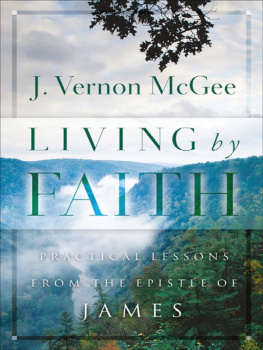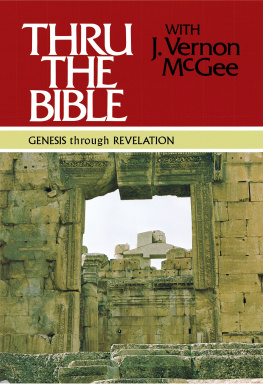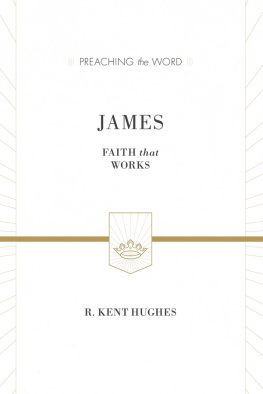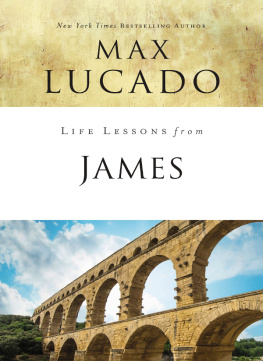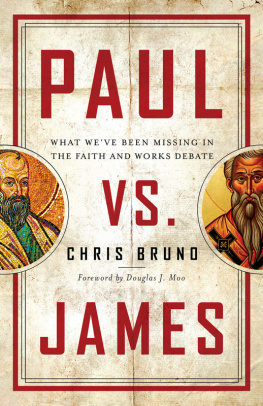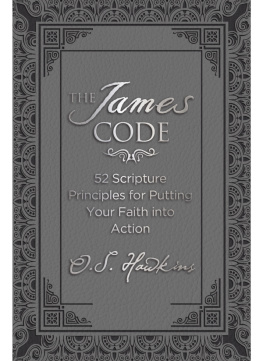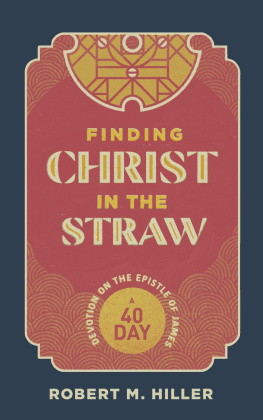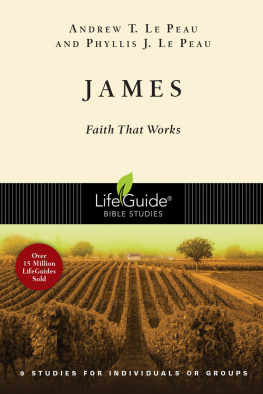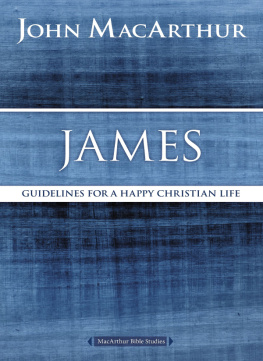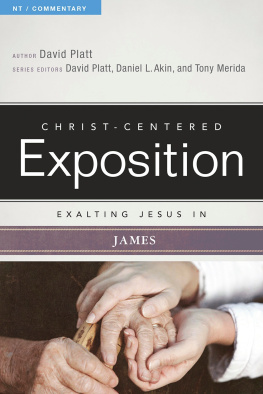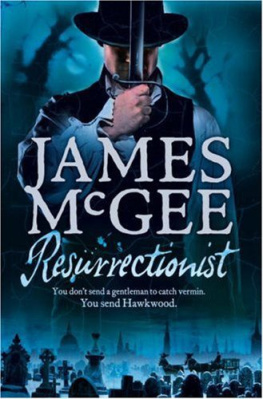LIVING by
FAITH

Copyright 2004 by Thru the Bible Radio Network
All rights reserved. No portion of this book may be reproduced, stored in a retrieval system, or transmitted in any form or by any meanselectronic, mechanical, photocopy, recording, scanning, or otherexcept for brief quotations in critical reviews or articles, without the prior written permission of the publisher.
Published in Nashville, Tennessee, by Thomas Nelson, Inc.
Scripture quotations noted NKJV are from THE NEW KING JAMES VERSION. Copyright 1979, 1980, 1982, Thomas Nelson, Inc., Publishers. Scripture quotations noted AMPLIFIED are from THE AMPLIFIED NEW TESTAMENT. Copyright 1958 by the Lockman Foundation (used by permission).
Library of Congress Cataloging-in-Publication Data
McGee, J. Vernon (John Vernon), 1904-1988
Living by faith : practical lessons from the Epistle of James /
J. Vernon McGee.
p. cm.
ISBN 0-7852-6077-3
1. Bible. N.T. JamesCriticism, interpretation, etc. 2. Christian
lifeBiblical teaching. 3. FaithBiblical teaching. I. Title.
BS2785.6.C48M34 2004
227'.9106dc22 2003024333
Printed in the United States of America
1 2 3 4 5 6 7 8 09 08 07 06 05 04
CONTENTS
T he Bible records several men by the name of James. So we ought to identify and introduce the James that we have in mind, and that is the one who wrote the Epistle of James. This James was our Lords flesh-and-blood brother. He was a son of Mary and Joseph, which made him a half brother of the Lord Jesus. We find a reference to him in the Gospel of Mark:
Is this not the carpenter, the Son of Mary, and brotherof James, Joses, Judas, and Simon? And are not Hissisters here with us? (Mark 6:3 NKJV)
I believe it was this same James whom Paul referred to in his epistle to the Galatians:
And when James, Cephas, and John, who seemed to bepillars, perceived the grace that had been given to me,they gave me and Barnabas the right hand of fellowship,that we should go to the Gentiles and they to thecircumcised. (Galatians 2:9 NKJV)
This James is the man who we believe is the author of the Epistle of James.
His epistle opens with this:
James, a bondservant of God and of the Lord JesusChrist... (James 1:1 NKJV)
I do not know about you, but I am confident that if I had been the Lords half brother on the human side, somewhere in this epistle I would let the reader know it. I would have brought in that fact in a very casual and humble way, but I surely would have mentioned it. However, James did not do that. Instead, he called himself a bond slave of God and of the Lord Jesus Christ.
Our Lord Jesus was so human here on this earth that even His own brethren did not believe at first. They had been brought up with Him and seen Him grow up. They may have noticed that He was unusual, but they did not believe He was the Savior of the world. Of course, your family members are always the hardest people to reach; yet they are the ones we should reach.
James came to know the Lord Jesus not only as his blood brother but as his own Savior, and then he became His bond slave. Notice what James called Himhe used His full name, the Lord Jesus Christ. James said, He is my Lord. Jesus was His human name, and James knew Him as Jesus, his half brother; but he also knew Him as Christ, the Messiah who had come and died for the sins of the world.
In studying this epistle, we discover that James had a little different outlook on life from the one we have. The fact of the matter is that he seems to have nothing in common with the contemporary Christianity that we know today. I do not believe he would have very much to do with this frivolous and sophisticated type of fundamentalism that we have about us these days. He was austere, rugged, serious, and solemn. He was also very practical. He believed that Christianity had to be put in shoe leather, and if you couldnt put it in shoe leather, then it wasnt true Christianity. So he was very pragmatic.
The subject of his epistle is the ethics of Christianity, not doctrine or works, as many seem to think. He was discussing faitha faith that works, my beloved. So he gave to us the skills and techniques necessary for living the Christian life faithfully.
THE ENTRANCE EXAMS
TO GODS UNIVERSITY
T HE BOOK OF JAMES HAS BEEN compared to the Book of Proverbs in the Old Testament; both emphasize the practical aspect of living the Christian life, focusing on the learning experience for the child of God.
The Book of Proverbs is not just a series of sayings strung together like beads on a string. Rather, a story is told. There is, first of all, the appeal to the young man as he begins life by enrolling in Gods school of wisdom. The young man matriculates in the school, the bell rings, the classes begin, and we see the development of the course throughout the Book of Proverbs.
The Epistle of James follows very much the same pattern. James enrolls the believer in the University of God. There are entrance exams to be taken, and they are not easy. The fact of the matter is, they are very difficult. Its a hard hurdle to clear. The lessons, first of all, are contrary to the thinking of the natural man. For that reason, the unsaved man could never qualify for these exams. This book was written to believers, so you must be a child of God to take these tests.
Lets imagine now that the bell has rung for the opening chapel, and Dean James is ready to give his first lecture, so lets listen in:
James, A servant of God and of the Lord Jesus Christ,to the twelve tribes scattered abroad [among theGentiles in the dispersion]: Greetings (rejoice)! (James 1:1 AMPLIFIED)
Rejoice is the warm word of welcome James gives to believers as they enter the University of God. By the way, this university has another name: its sometimes called the school of hard knocks. But James said, Rejoice. In many ways, that is the keythe overtone and the undertoneof the Epistle of James.
All believers are candidates for a degree in Gods University. In what field will we earn our degree? Well, theres only one field covered in this university. The subject is made very clear, yet many manage to miss it. I once heard a liberal lecturer speak on the Epistle of James, and he said that the theme was good worksand that James actually wrote his epistle to contradict and correct Paul the apostle, who emphasized justification by faith apart from works. Well, James could not have written to correct Paul, for the very simple reason that James epistle was the first book written in the New Testament. If there were any correcting to be done, Paul would have done it.
The theme of the Epistle of James is not works at all. The theme is faith. Its the same theme that Paul had, but James looked at it from a different viewpoint; he said that faith produces works.
We are saved
by faith,
we grow
by faith,
we live
by faith,
and we die
by faith.
When James discussed works, he was not talking about the works of the law, but of faith. We may put it like this: Paul talked about the root, which is faith; James discussed the fruit and works of faith. Therefore, our major in the University of God is faith; we are saved by faith, we grow by faith, we live by faith, and we die by faith. The child of God enters a life of faith the moment he trusts Christ, and that is the great theme that God teaches in His university.
As the dean of Gods University, James first lecture is on the subject of faithnamely, the testing of faith through trials:
Next page
